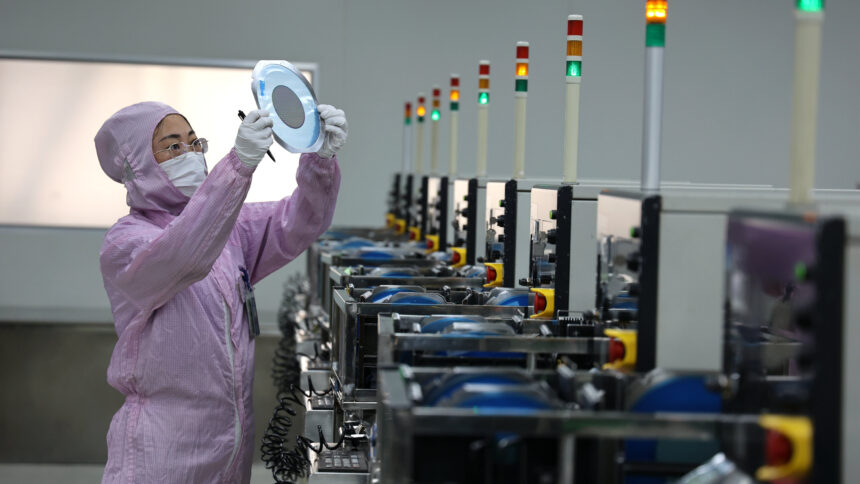The tech industry is right in the middle of a U.S.-China disagreement. Around late August 2025, the U.S. made things tougher for chip making in China. They canceled some permissions that big guys like Samsung, SK Hynix, and Intel used to have. These permissions let them keep using U.S. tech in their Chinese factories without any problems. Now, they’re gone, and these companies have to ask for new licenses, which won’t be simple to get. This could seriously mess with the chip market, supply chains, and also tech prices.
Why Chips Really Matter
Think of chips as the brains of all our gadgets. Your phone, electric cars, AI in hospitals, even your refrigerator use them. They’re super-important these days. Whoever is in charge of chip production kind of gets to decide how fast the world comes up with new stuff.
The U.S. says keeping China from getting fancy chips is about keeping the country safe. They’re afraid China might use these chips to make its military tech, AI, and surveillance systems better. But China sees chips as a way to take the lead in tech and challenge the U.S. in areas like AI and computers. This is like a race to be the best at tech, and chip factories are where the action is.
What the New U.S. Rules Mean for Chip Makers
The new rules are much stricter. Chip makers like Samsung and SK Hynix, who make a ton of memory chips in China, are in a tricky position now. It’ll be hard for them to make their Chinese factories bigger and better if they can’t easily keep using U.S. tech to upgrade.
Basically, if these companies want to upgrade equipment, make their factories bigger, or introduce new products in China, they have to get permission from the U.S. government. Intel already left its Dalian factory by selling it to SK Hynix, and this makes the industry even more scared that China’s becoming too risky for chip making.
So, companies will probably move their factories to places like South Korea, Japan, Taiwan, or even back to the U.S. This might mean the U.S. starts making more chips again, but it won’t be quick or cheap.
How This Affects the Whole World
Even though this seems between two big countries, everyone will see the results. Chip supplies around the world are all linked together, so if something goes wrong in one place, it quickly affects everything.
For regular people, this could mean paying more for phones, game consoles, laptops, and other things. Car companies, especially the ones making electric cars, might also see prices go up if chip supplies get tight. And in areas like hospitals and AI, some tech might take longer to roll out, which could slow down treatments.
These new rules will make things harder for companies that need to be sure they get their deliveries on time. They were already dealing with chip shortages, and now it’s even less of a guarantee. Products might take longer to arrive, and it could cost companies more money.

What’s Really Going On: Who Leads in Tech
This is about more than just chips. It’s about who gets to be the boss. The U.S. is trying to protect its lead in tech, while China wants to become a major player. And the chip industry, which is worth tons of money, is right in the middle.
These rules also make things awkward for U.S. friends. South Korea, where Samsung and SK Hynix are located, is stuck between its ally (the U.S.) and its biggest trading partner (China). Similar issues are popping up in Japan, Taiwan, and Europe, where governments are trying to figure out how closely they’ll follow the U.S.’s push for tougher rules.
It’s about money, for sure, but it’s also about how global relationships and trade are changing because of tech.
What You Should Know
Global tech policy might sound like it only matters to governments and big companies. But it affects you more than you think. The U.S. cracking down on China chip production could affect:
Your next phone: Prices might go up, and you might not be able to find one.
Electric and hybrid cars: Car companies need advanced chips, so cars might cost more to build.
AI stuff: Everything from smart appliances to hospital tech could take longer to show up.
Jobs: Moving chip factories out of China could mean new jobs open up somewhere else, but it’ll be expensive overall.
Even if it seems like a battle between big powers, you’ll feel it in your wallet, the stuff you buy, and how fast new tech comes out.
What Happens Next?
Things are uncertain. The U.S. government is giving chip makers a few months to ask for new licenses, but it doesn’t look like they’ll get approved. China will probably fight back by focusing on making its own chips and maybe restricting U.S. companies there.
The legal and political fights will keep going, but one thing’s for sure: the chip world is changing. Governments, companies, and regular people are getting ready for what’s next.
The U.S. getting tough on chip factories in China is a big deal in the global tech world that will affect economies, industries, and everyday life for years. What started as worries about security has turned into a full-on tech fight, with chips as where the fight is happening.
This is about who gets to control the future of tech. And when so much is at stake, we’re all involved, whether we know it or not.




